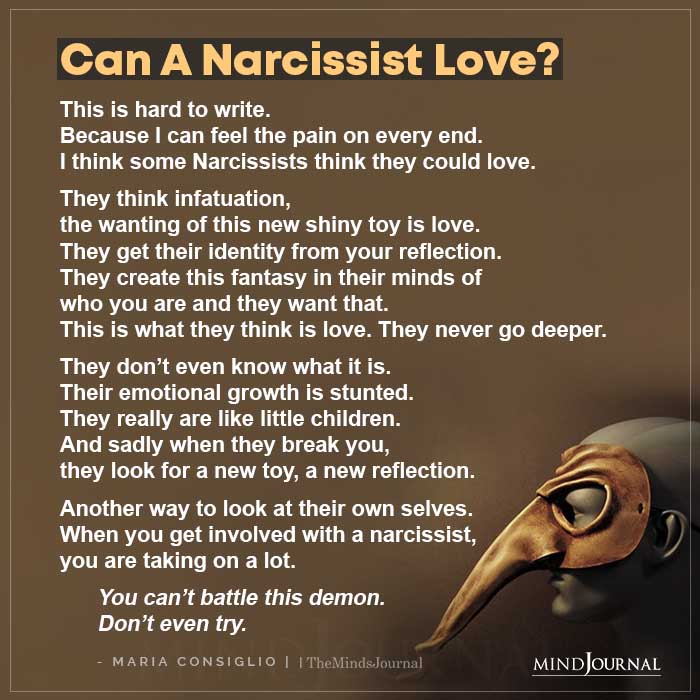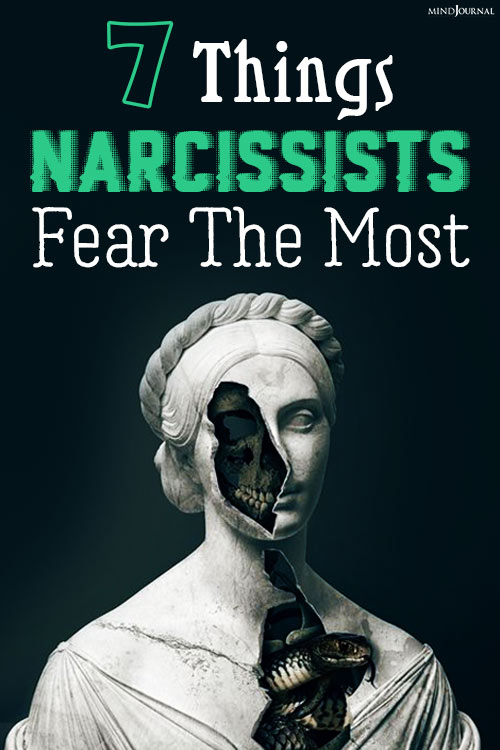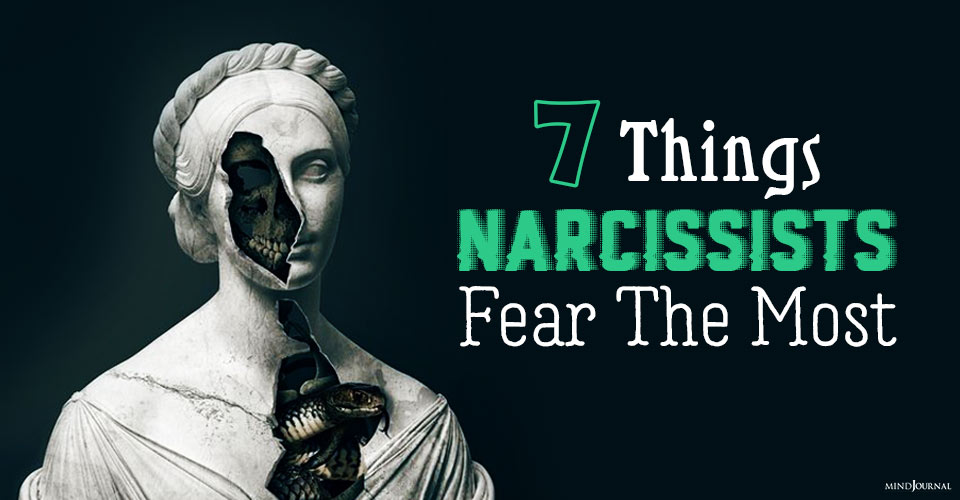Contrary to popular belief, there are quite a few things narcissists are most afraid of. Actually, there are 7 things narcissists fear the most, more than anything. So, what are narcissists most afraid of?
I was actually going to try to post funny search terms again, but alas, they were just not funny, so I nixed that idea. However, I did find one that inspired me to write this post: What 6 things are narcissists most scared of?
It’s a good question. Are narcissists afraid of anything? You bet they are, and there are 7 things that scare them silly, not just 6.
Related: 5 Steps To Ignore A Narcissist Who Tries To Hurt You
7 Things Narcissists Fear The Most
1. Abandonment and rejection.
Narcissists can’t stand being rejected or abandoned. That’s why they fly into rages and punish and threaten you if you threaten to leave them, and love bomb you if you do manage to get away. To reject a narcissist means you are rejecting the false self they have so carefully constructed to impress you.
To reject that false self negates their entire reason for existing since whatever true self they may have left is completely inaccessible to them and the false self cannot survive on its own; it’s completely dependent on the approval and attention of others, who it feeds from like a vampire.
When you reject a narcissist they are forced to confront their own emptiness and nothing scares them more than that. They will fight tooth and nail to avoid it, even if it means they have to destroy you in the process.

2. Being made fun of.
Narcissists have no sense of humor. Nada. None. Zero. Zip. They may laugh cruelly at you when you fall and break your arm, and they may chuckle at the discomfort of someone else (since they have almost no empathy), especially if the discomfort was caused by them (because remember, to them you are not a real person but an object), but they are completely incapable of ever laughing at themselves.
A few years ago on a forum, I posted on, there was a man who became enraged when someone wrote “LOL” at a joke someone else made at his expense (the joke wasn’t very offensive), and from then on he gave both of them the silent treatment.
They take themselves very, very seriously and are very, very sensitive. But that sensitivity doesn’t extend toward anyone but themselves.
The reason they are so bothered by jokes at their expense and can’t laugh at themselves is that the self they present to the world is a false one that must be propped up and supported at all times by everyone else.
To poke fun at a narcissist is to poke fun at a self that’s as empty inside as a puppet. It has no substance. It will fall to pieces and then the narcissist is forced to confront that terrifying emptiness that constantly haunts them.
Related: 8 Things A Narcissist Fears The Most
3. Being disrespected.
No one likes to be treated with disdain or disrespect, but the narcissist is downright phobic about it. He or she worries about it all the time and imagines slights and personal attacks even where they don’t exist.
Again, it boils down to the false self which he or she must constantly keep propped up. It’s your job to puff it up and inflate it constantly lest it collapses into a limp pile of flimsy rubber. Disrespecting a narcissist is like popping a hole in their balloon self and they feel like they are going to die.
To avoid this, a narcissist uses every defense mechanism they have in their arsenal–gaslighting, rages, silent treatment, lying, projection, denial, fabricating, and false affection–to keep you inflating their balloon self so they don’t have to acknowledge the horror of recognizing they have lost their real one.
4. Being ignored.
This is a no-brainer. Ignoring a narcissist means giving them no supply at all, and without narcissistic supply, the narcissist dies a slow death. Or believes they will. That’s why some narcissists would even rather be hated than be ignored.
Negative attention is still attention, and at least it provides an acknowledgment that they still exist. When you ignore a narcissist, it’s as frightening to them as being killed. They’re no longer confident they exist without your attention.
5. Exposure.
If you call out a narcissist on their abusive behavior, they will usually become very angry. Their anger might be expressed in rage or in more covert means such as the silent treatment or gaslighting you.
They don’t like to be held accountable for the things they do to others, because that means they have to admit they are less than perfect. It also means they have to acknowledge the humanity of someone else, which they aren’t capable of doing.
Narcissists are all too aware of their imperfections, but only at the subconscious level, and the way they handle this is to project their own imperfections onto you. So a narcissist might tell you that YOU are the narcissistic one, or that YOU are the abuser.
They’re also good at getting others to side against you, and those people become their flying monkeys. They will accuse you of doing things that they themselves have done and everyone believes them and not you.
You start to feel like you’re living in a hellish world of smoke and mirrors, where you’re no longer sure what’s real and what isn’t.
The narcissist has, unconsciously or consciously, set up this elaborate lie as a massive defense mechanism against being exposed as imperfect and flawed just like everyone else, because being forced to acknowledge their shortcomings is to expose their vulnerabilities, and being vulnerable is incredibly terrifying to them. They blame so they don’t have to feel shame.
Related: 11 Things Narcissists Can’t Stand (Makes Them Miserable)
6. Loss of the trappings of youth and success.
As narcissists age, they often grow even more abusive (a very few may improve–but they probably weren’t a high spectrum, to begin with). That’s because aging means a loss of looks, career, health, possibly even a spouse (who provides a narcissist with supply), and in some cases even financial solvency.
All these things are proof to a narcissist that they still have value and are still admired and respected.
Somatic narcissists, who are most concerned with their health or physical appearance, have never developed other aspects of themselves that could be fallen back on when those things begin to go; that’s because the false self is a flimsy one-dimensional construct and is incapable of love, true attachment, friendship, and other things that the rest of us can fall back on when we’re old and not in such great physical shape or health anymore.
If someone has spent their entire lives only concerned with their appearance, once that goes, what’s left?
Cerebral narcissists, who are concerned with their intellectual ability or business acumen, may be able to hang onto those assets a bit longer, but eventually, their minds may begin to become less sharp or they may be forced to retire or reduce their hours of working.
Having to retire is a huge blow to a narcissist whose entire identity is tied up in his or her career and earning ability. What is left?
In both cases, a narcissist experiences an almost total loss of supply, and to avoid the ensuing depression, they lash out and attack others like angry dogs. That’s why old narcissists are so often cranky and mean. They’re also terrified of death, the last thing on the list that terrifies them.

7. Death.
Narcissists are afraid of death. Every narcissist I’ve ever known lives in mortal terror of death. That’s because death is the ultimate loss of narcissistic supply. Death means complete annihilation of the ego and there’s nothing more horrifying to a narcissist than that because their ego is all they are.
Related: How To Hurt Back A Narcissist
Personally, I think some also fear hell. They know on some deep level how badly they’ve treated and exploited others and think they might be held accountable for it in the afterlife. I’ve seen a lot of narcissists who suddenly become extremely religious in their old age.
I think that’s because they think by being religious, they may be able to ward off any accountability after they die.
Want to know more about the things narcissists fear the most? Check this video out below about the things narcissists are most afraid of!
Written by Lauren Bennett Originally appeared on Lucky Otters Haven Printed with permission from the author













Leave a Reply